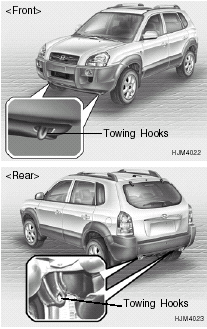Emergency towing

For emergency towing when no commercial tow vehicle is available, attach a tow cable, chain or strap to one of the towing hooks under the front/rear of your vehicle. Be very careful when attempting this procedure when the vehicle is on any unpaved surface to avoid damage to your vehicle.
Nor should towing be attempted if the wheels, drive train, axles, steering or brakes are damaged.
Before towing, be sure the transaxle is in neutral and the key is in "ACC" (with the engine off) or in the "ON" position (with the engine running). A driver must be in the towed vehicle to steer it and operate the brakes.
NOTE:
To avoid serious damage to your 4WD vehicle,
limit the towing to 10 mph and not for
more than 1 mile at ANY TIME.
See also:
Instrument panel illumination
When the vehicle’s parking lights or headlights are on, push the illumination
control switch left or right to adjust the brightness of the instrument panel illumination.
The illumination inten ...
Checking the amount of air conditioner refrigerant and compressor lubricant
When the amount of refrigerant is low, the performance of the air conditioning
is reduced. Overfilling also has a negative influence on the air conditioning system.
Therefore, if abnormal operatio ...
Don't let ice and snow accumulate underneath
Under some conditions, snow and ice can build up under the fenders and interfere
with the steering. When driving in severe winter conditions where this may happen,
you should periodically check un ...


